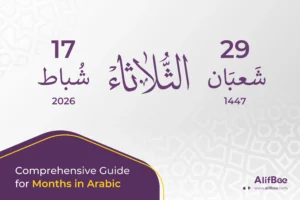10 Essential Mouth-Related Arabic Verbs for Everyday Actions
We use our mouths for all kinds of actions, from speaking and laughing to eating and singing. Learning the Arabic verbs for these everyday actions helps you express yourself naturally and confidently and communicate a variety of actions and emotions.
In this post, we’ll explore ten essential verbs related to the mouth, with examples to deepen your understanding and make them easier to use.
Verb 1: يَتَكَلّمُ\ تَكَلّمَ
to speak
Yatakallmu / takallma
Examples
أمثلة
The teacher speaks to the students
تتكلّم المعلّمة مع الطّلاب
The politician was speaking about the new law
كان السّياسيّ يتكلّم عن القانون الجديد
The mother spoke softly to her child
تكلّمت الأمُّ بهدوء مع طفلها
The verb تَكَلّمَ (takallama) in Arabic means “to speak” or “to talk.” In its present tense form, it becomes يَتَكَلّمُ (yatakallamu). This verb is commonly used to describe the act of verbal communication and is often followed by the preposition مع (maʿa) meaning “with” or عن (ʿan) meaning “about,” to indicate whom or what the speaking is about.
Verb 2: يَأكُلُ\ أَكَلَ
to eat
Yaʼkulu / akala
Examples
أمثلة
The man eats a sandwich for lunch
يأكل الرّجل شطيرة على الغداء
The child was eating ice cream
كان الطّفل يأكل المثلّجات
The family ate dinner together
أكلت العائلة العشاء معًا
The verb أَكَلَ (akala) in Arabic means “to eat.” In the present tense, it becomes يَأْكُلُ (yaʾkulu). This verb is often followed by the type of food being consumed or a prepositional phrase indicating the time or place of the meal, such as على الغداء (for lunch) or معًا (together).
Verb 3: يَشرَبُ\ شَرِب
to drink
Yashrabu / sharib
Examples
أمثلة
The athlete drinks water after the workout
يشرب الرّياضيّ ماءً بعد التّمرين
The woman drank coffee in the morning
شربت المرأة القهوة في الصّباح
The couple is drinking juice at the restaurant
يشرب الزّوجان عصيرًا في المطعم
The verb شَرِبَ (shariba) in Arabic means “to drink.” In its present tense form, it becomes يَشْرَبُ (yashrabu). Use it to describe the action of having drinks. This verb is typically followed by the name of the drink, such as ماءً (water) or القهوة (coffee). Additionally, it may include prepositional phrases for context, such as في الصّباح (in the morning) or بعد التّمرين (after the workout).
Verb 4: يَضحَكُ\ ضَحِك
to laugh
Yaḍḥaku / ḍaḥik
Examples
أمثلة
The friends laughed at the funny joke
ضحك الأصدقاء على النُّكتة المضحكة
The audience laughed during the theater performance
ضحك الجمهور خلال العرض المسرحيّ
The child laughs when tickled
يضحك الطفل عندما يدغدغه أحد
The verb ضَحِكَ (ḍaḥika) in Arabic means “to laugh.” In the present tense, it becomes يَضْحَكُ (yaḍḥaku). It is often followed by prepositional phrases indicating the cause of laughter, such as على (ʿalā) for “at” or عندما (ʿindamā) for “when,” which introduces the situation or action that prompts laughter.
Verb 5: يُغَنّي \ غَنّى
to sing
Yughanny / ghanná
Examples
أمثلة
The singer is performing on stage
تغنّي المطربة على المسرح
The children sang a song in the school
غنّى الأطفال أغنية في المدرسة
The man sings in the shower
يغنّي الرّجل في الحمّام
The verb غَنّى (ghanná) in Arabic means “to sing.” In the present tense, it becomes يُغَنّي (yughanny). It is typically followed by a prepositional phrase indicating the place or occasion of the singing, such as في المدرسة (in the school) or على المسرح (on stage).
Verb 6: يَهمُس \ هَمَسَ
to whisper
Yahmus / hamasa
Examples
أمثلة
The student whispered to his classmate during the lecture
همس الطّالب لزميله أثناء المحاضرة
The mother whispered a secret to her daughter
همست الأمّ سرًا لابنتها
The couple whispers sweet nothings to each other
يهمس الزّوجان بكلمات حنونة لبعضهما البعض
The verb هَمَسَ (hamasa) in Arabic means “to whisper.” In its present tense form, it becomes يَهْمُس (yahmus). It is often followed by a prepositional phrase with لـ (li-) to indicate whom the whisper is directed to, or with a noun to specify the content or context of the whisper, such as سرًا (a secret) or بكلمات حنونة (sweet words).
Verb 7: يُقَبّل \ قَبّل
to kiss
Ayuqabbil / qabbal
Examples
أمثلة
The mother kissed her child's forehead
قبّلت الأمّ جبهة طفلها
The child kissed his cat with affection
قبّل الطّفل قطّته بحب
The grandmother tenderly kisses her little grandson's face
تقبّل الجدّة وجه حفيدها الصغير بحنان
The verb قَبّل (qabbala) in Arabic means “to kiss.” In the present tense, it becomes يُقَبّل (yuqabbil).
Verb 8: يَتَثاءَب \ تَثاءَبَ
to yawn
Yatathāʼab / tathāʼaba
Examples
أمثلة
The student yawned during the class
تثاءب الطّالب أثناء الدرسِ
The tired employee always yawns during the meeting
يتثاءب الموظّف المتعب دائمًا خلال الاجتماع
The bored audience yawned during the presentation
تثاءب الجمهور خلال العرض المُمِلِّ
The verb تَثَاءَبَ (tathāʼaba) in Arabic means “to yawn.” In the present tense, it becomes يَتَثَاءَب (yatathāʼab). This verb is used to describe the involuntary action of opening the mouth wide while taking in a breath, typically as a sign of tiredness, boredom, or drowsiness.
Verb 9: يُصَفّر \ صَفّرَ
to whistle
Yuṣaffir / ṣaffara
Examples
أمثلة
The man is whistling a happy tune
يصفّر الرجل لحنًا سعيدًا
The birdwatcher was whistling to mimic bird sounds
كان مراقب الطيور يصفّر ليقلّد أصوات الطّيور
The coach whistled to get the players' attention
صفّر المدرب لجذب انتباه اللّاعبين
The verb صَفّرَ (ṣaffara) in Arabic means “to whistle.” In the present tense, it becomes يُصَفّر (yuṣaffir). This verb is used to describe the action of producing a sound by blowing air through pursed lips, or, in some cases, through an instrument like a whistle.
Verb 10: يَرتَشِفُ \ اِرتَشَفَ
to sip
Yartashifu / irtashafa
Examples
أمثلة
She is sipping her tea slowly while reading a book
ترتشف شايها ببطء وهي تقرأ كتابًا
The man sipped his soup to avoid burning his mouth
ارتشف الرّجل حساءه لتجنّب حرق فمه
The couple is sipping coffee while enjoying the beautiful view
يرتشف الزّوجان القهوة وهما يستمتعان بالمنظر الجميل
The verb اِرْتَشَفَ (irtashafa) in Arabic means “to sip.” In its present tense form, it becomes يَرْتَشِفُ (yartashifu). It describes the act of drinking something slowly and in small amounts, typically for enjoyment or to savor the taste.
Final word
Now you know 10 new verbs related to the mouth! You will certainly find them helpful in talking about everyday actions. Use and practice them to build a more natural and engaging speaking style.
Enjoy your learning journey!








